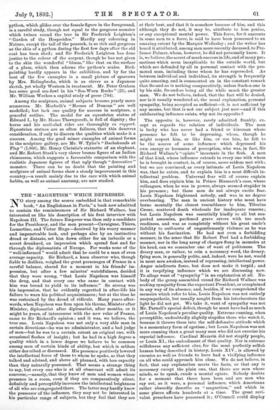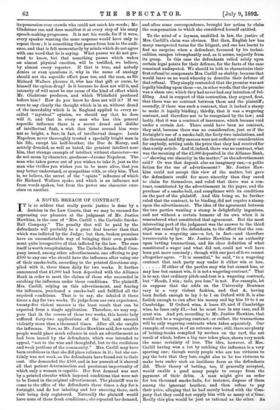THE " MAGNETISM " WHICH DEPRESSES.
NO story among the scores embedded in that remarkable book, "An Englishman in Paris," a book now admitted to contain the reminiscences of Sir Richard Wallace, has interested us like his description of his first interview with Napoleon III. The future Emperor was then only a candidate for the Presidency, and the men present—Cavaignac, Thiers, Lamartine, and Victor Hugo—deceived by his weary manner and impenetrable look, and perhaps also by an instinctive dread or distaste, set him down either for an imbecile or a secret drunkard, an impression which spread fast and far through the diplomatists of Europe. For weeks none of the " well-informed " would admit that he could be a man of even average capacity. Sir Richard, a keen observer who, though liable to dislikes, weighed the great personages of France in a eareful balance, shared for a moment in his friends' im- pression, but after a few minutes' watchfulness, decided that they were wrong, "that Louis Napoleon was himself the drug, and that every one who came in contact with him was bound to yield to its influence." So strong was his impression, that he evidently regretted in after-life his failure to warn his political acquaintances ; but at the time he was restrained by the dread of ridicule. Many years after- wards, when Napoleon was firm upon his throne, Minister after Minister, diplomatist after diplomatist, after months, or it might be years, of intercourse with the new ruler of France, came to Sir Richard's opinion ; and it was, we believe, the true one. Louis Napoleon was not only a very able man in certain directions—he was no administrator, and a bad judge of men—but he was to a certain extent an original one, with occasional flashes of insight ; but be had in a high degree a quality which in a lower degree we believe to be common among men of certain kinds of ability, but which is seldom either desaribed or discussed. His presence positively lowered the intellectual force of those to whom he spoke, so that they talked and advised, and above all planned, with less capacity than they naturally possessed. That seems a strange thing to say, but every one who is at all observant will admit its converse,—namely, that they know of men and women whose presence in a room, even if they are comparatively silent, definitely and perceptibly increases the intellectual brightness of all who are congregated there. The latter may hardly know the possessor of the influence, they may not be interested in his particular range of subjects, but they feel that they are at their best, and that it is somehow because of him, and this although they do not, it may be, attribute to him genius, or any exceptional mental power. This force, for it amounts in some men to a force, is said to have been possessed to an amazing extent by the Marquis Wellesley ; and the writer has heard it attributed, among men more recently deceased, to Pro- fessor Palmer, whom, however, he did not personally know. It is, we believe, the secret of much success in life, and of many prc- motions which seem inexplicable to the outside world, but which are defended by all in personal contact with the pro- moted man, including those whom he has superseded. As between individual and individual, its strength is frequently quite amazing, and is commented on in the constant remark that So-and-so is nothing comparatively, unless Such-a-one is by his side, So-and-so being all the while much the greater man. We do not believe, indeed, that the fact will be denied, nor is it usually wondered at, the usual explanation, personal sympathy, being accepted as sufficient—it is not sufficient by any means, but that is not our subject just now—and if this exhilarating influence exists, why not its opposite ?
The opposite is, however, rarely admitted frankly, ex- cept as regards the relation of individuals. The man is lucky who has never had a friend or kinsman whose presence he felt to be depressing, whom, though be might respect him, or like him, or use him, he felt to be the source of some influence which depressed his own energy or keenness of perception, who was, in fact, Sir Richard Wallace's " opiate " incarnate in the flesh. A man of that kind, whose influence extends to every one with whom he is brought in contact, is, of course, more seldom met with ; but we are convinced, as every intimate of Louis Napoleon was, that he exists, and to explain him is a most difficult in- tellectual problem. Universal fear will of course explain him, and does explain him in Prince Bismarck's case, whose colleagues, when he was in power, always seemed stupider in his presence ; but these men do not always excite fear. Louis Napoleon frightened nobody, and was in no degree overbearing. The man in ancient history who must have borne mentally the closest resemblance to him, Tiberius Omar, scattered death wholesale for inadequate reasons ; but Louis Napoleon was essentially kindly to all but sus- pected assassins, pardoned grave errors with too much readiness, and was as completely without his great uncle's liability to outbursts of ungentlemanly violence as he was without his fascination. He had not even a forbidding manner, in the sense that Sir Robert Peel had a forbidding manner, nor in the long array of charges flung in memoirs at his head, can we remember one of want of politeness. The dreary man, or rather, to coin a necessary word, the dreary. fying man, is generally polite, and, indeed, were he not, would in most men awaken, instead of repressing, intellectual power. Anger misdirects force, but does not make it torpid ; and it is torpifying influence which we are discussing now. To allege want of " sympathy " is no explanation at all. No- body of the group assembled round Sir Richard Wallace was seeking sympathy from the expectant President, or complained in any way of its absence, and, besides, if we comprehend the memoirs which refer to him, Louis Napoleon was not entirely unsympathetic, but usually sought from his interlocutors the light he did not get. We take it, want of sympathy was not Mr. Parnell's special defect, though he must have had so much of Louis Napoleon's peculiar quality. Extreme cunning, when perceptible, undoubtedly slightly stupifies those who watch it, because it throws them into the self-defensive attitude which is a momentary form of egotism ; but Louis Napoleon was not more canning than a great many men who did not exercise his especial influence. Cardinal Mazarin did not stupify people, or Louis XL, the embodiment of that quality. Nor is extreme selfishness any sufficient clue, for the most perfectly selfish human being described in history, Louis XIV., is allowed by enemies as well as friends to have bad a vivifying influence on all who could approach him close. We do not believe, in fact, that any explanation meets the facts, or that any is necessary except the plain one, that there are men whose minds, so to speak, exude a mental opiate. Nobody doubts for a moment that there have been and are men who ray out, as it were, a personal influence, which Americans rather absurdly describe as "magnetism," and which in some places affects hundreds at a time. The great revi- valist preachers have possessed it ; O'Connell could display its possession over crowds who could not catch his words ; Mr. Gladstone can and does manifest it at every step of his many speech-making progresses. It is not his words, for if it were, every speaker wanting the same response would have only to repeat them ; it is something that passes from him to the audi- ence, and that is felt momentarily by minds which do not agree with one word that he is saying. What passes we do not pre- tend to know, but that something passes which wakes an almost physical emotion, will be testified, we believe, by almost every reporter. If that is true, and nobody denies or even questions it, why in the name of analogy should not the soporific effect pass too, and the man, as Sir Richard Wallace phrases it, who has that gift or curse, be himself the opium-drug? Is it because he does not will it, and intensity of will must be one cause of the kind of effect which Mr. Gladstone produces, and which Whitefield produced before him ? How do you know he does not will it P If we were to say clearly the thought which is in us, without dread of the incredulity which is in England applied to every so- called "mystical" opinion, we should say that he does will it, and that in every man who has this general soporific influence there is a. secret dread and dislike of intellectual flash, a wish that those around him were not so bright, a fear, in fact, of intellectual danger. Louis Napoleon never thoroughly treated a specially bright man in his life, except his half-brother, the Dec de Morny, and acutely dreaded, as well as hated, the greatest intellect near him, that strange example of intellect without character—we do not mean by character, goodness—Jerome Napoleon. The man who takes power out of you wishes to take it, just as the man who vivifies you wishes you to be more alive, that you may better understand, or sympathise with, or obey him. That is, we believe, the secret of the " opiate " influence of which Sir Richard Wallace spoke, and which is an influence not from words spoken, but from the power one character exer- cises on another.



















































 Previous page
Previous page